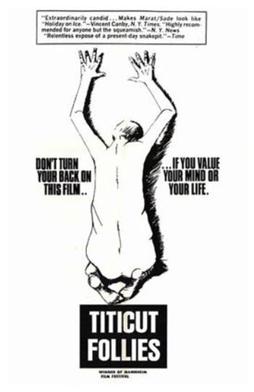Titicut Follies
Titicut Follies is a documentary film directed by Frederick Wiseman that premiered in 1967. The film is a controversial and candid portrayal of the conditions inside the Bridgewater State Hospital for the criminally insane in Bridgewater, Massachusetts. Wiseman's documentary is notable for its unflinching look at the treatment of the patients/inmates, the living conditions, and the attitudes of the staff within the institution.
Synopsis[edit | edit source]
Titicut Follies presents a series of vignettes that depict the daily life and treatment of patients at Bridgewater State Hospital. The film is devoid of narration, allowing the scenes to speak for themselves. It covers various aspects of the institution, including the interactions between staff and patients, the living conditions, and the various forms of therapy and entertainment provided to the inmates. The title of the film refers to an annual talent show, "Titicut Follies," put on by the patients, which is one of the few moments of relief from the otherwise grim environment depicted in the documentary.
Production[edit | edit source]
The production of Titicut Follies was marked by Wiseman's fly-on-the-wall approach, utilizing minimal crew and equipment to capture the reality of the institution without interference. This method allowed for a raw and unfiltered look at the conditions within Bridgewater State Hospital. The filming took place over a short period, but it was enough to gather a comprehensive view of the institution's operations and the lives of its patients.
Controversy and Legal Issues[edit | edit source]
Upon its release, Titicut Follies sparked significant controversy and legal battles. The state of Massachusetts sought to ban the film, arguing that it violated the privacy of the patients and could potentially harm their well-being. The courts initially sided with the state, leading to a ban on the film's public exhibition. It was argued that the documentary exposed the patients to public ridicule and that certain scenes, including those showing force-feeding and naked patients, were particularly invasive. The ban was eventually lifted, but only after several years of legal disputes. The case raised important questions about the balance between freedom of expression and the right to privacy, especially in sensitive contexts such as mental health institutions.
Impact and Legacy[edit | edit source]
Despite the initial controversy, Titicut Follies has been recognized as a groundbreaking work in the field of documentary filmmaking. It is credited with exposing the deplorable conditions and inhumane treatment of patients in mental health institutions, leading to public outcry and demands for reform. The film has also been influential in discussions about the ethics of documentary filmmaking, particularly regarding the depiction of vulnerable subjects.
Wiseman's work paved the way for future documentaries that aim to shed light on social injustices and institutional failures. Titicut Follies remains a powerful example of the potential of documentary film to influence public perception and policy.
See Also[edit | edit source]
Search WikiMD
Ad.Tired of being Overweight? Try W8MD's physician weight loss program.
Semaglutide (Ozempic / Wegovy and Tirzepatide (Mounjaro / Zepbound) available.
Advertise on WikiMD
|
WikiMD's Wellness Encyclopedia |
| Let Food Be Thy Medicine Medicine Thy Food - Hippocrates |
Translate this page: - East Asian
中文,
日本,
한국어,
South Asian
हिन्दी,
தமிழ்,
తెలుగు,
Urdu,
ಕನ್ನಡ,
Southeast Asian
Indonesian,
Vietnamese,
Thai,
မြန်မာဘာသာ,
বাংলা
European
español,
Deutsch,
français,
Greek,
português do Brasil,
polski,
română,
русский,
Nederlands,
norsk,
svenska,
suomi,
Italian
Middle Eastern & African
عربى,
Turkish,
Persian,
Hebrew,
Afrikaans,
isiZulu,
Kiswahili,
Other
Bulgarian,
Hungarian,
Czech,
Swedish,
മലയാളം,
मराठी,
ਪੰਜਾਬੀ,
ગુજરાતી,
Portuguese,
Ukrainian
Medical Disclaimer: WikiMD is not a substitute for professional medical advice. The information on WikiMD is provided as an information resource only, may be incorrect, outdated or misleading, and is not to be used or relied on for any diagnostic or treatment purposes. Please consult your health care provider before making any healthcare decisions or for guidance about a specific medical condition. WikiMD expressly disclaims responsibility, and shall have no liability, for any damages, loss, injury, or liability whatsoever suffered as a result of your reliance on the information contained in this site. By visiting this site you agree to the foregoing terms and conditions, which may from time to time be changed or supplemented by WikiMD. If you do not agree to the foregoing terms and conditions, you should not enter or use this site. See full disclaimer.
Credits:Most images are courtesy of Wikimedia commons, and templates, categories Wikipedia, licensed under CC BY SA or similar.
Contributors: Prab R. Tumpati, MD

